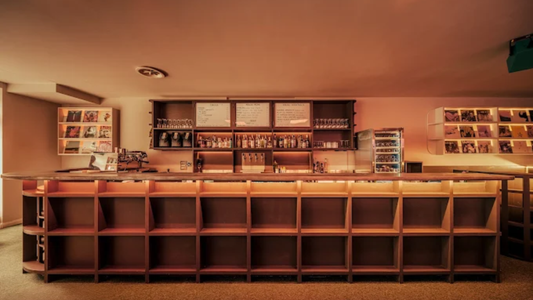
Tinariwen – The Radio Tisdas Sessions (2001)
By Rafi Mercer
A guitar begins, its tone dry, wiry, unadorned — like metal string against desert air. Then the rhythm settles, cyclical and hypnotic, while voices join in call and response, chanting in Tamashek. There is no rush, no flourish. Only steadiness, repetition, the sound of endurance. This is The Radio Tisdas Sessions, released in 2001, the first widely available album by Tinariwen, the Tuareg collective whose music carried the desert into the world. It is not only a landmark of so-called “desert blues” but a record that redefined what it means for music to be both local and global.
Tinariwen’s story is as important as their sound. Formed in the late 1970s by Tuareg rebels living in exile in Libya and Algeria, the group used music as both expression and resistance. Their songs carried the weight of displacement, the struggle for independence, the longing for homeland. Armed with guitars rather than rifles, they transformed grief and defiance into melody and rhythm. By the 1990s, their cassettes circulated widely across the Sahara, passed hand to hand, becoming both soundtrack and lifeline for Tuareg communities.
The Radio Tisdas Sessions was recorded in Kidal, Mali, at a local radio station — hence its title. The conditions were raw, the equipment basic, but the atmosphere intimate. What emerged was a document that felt both authentic and revolutionary. For many outside listeners, it was their first encounter with Tinariwen’s sound: guitars interweaving in modal scales, voices chanting with communal force, rhythms steady as walking across sand.
Tracks like “Le Chant des Fauves” and “Bismillah” embody their style. The guitars are not flashy; they are insistent, repetitive, circular. The songs rarely build to climax; they circle, trance-like, mirroring desert horizons that stretch without end. The voices, often in unison or call and response, carry poetry of resistance and resilience: exile, return, dignity, longing. Even without understanding the words, the emotion is palpable.
What makes The Radio Tisdas Sessions extraordinary is its humility. There is no attempt to impress with production or virtuosity. Its power lies in its directness, its steadiness, its communal voice. It is music that resists the Western notion of song as spectacle. Instead, it is survival music, ritual music, music that exists to hold people together.
When the album was released internationally on the World Village label, critics immediately hailed it as a revelation. It was compared to the blues — hence the term “desert blues” — but this was always an imperfect analogy. The Tuareg sound is its own tradition, rooted in nomadic culture, shaped by exile and resistance, distinct yet resonant with global listeners. Its minimalism and repetition appealed as much to fans of rock and electronic music as to lovers of folk and world music.
Listening today, the album feels both grounded and universal. For Tuareg communities, it was an assertion of identity, a cultural anchor. For international audiences, it was an entry point into a world they may never see but could hear. Its inclusivity lies in its openness: the grooves are steady, the melodies memorable, the emotion clear. Women and men, across languages and borders, can find themselves within its repetitions.
On vinyl, the rawness becomes part of its magic. The guitars sound even drier, the vocals closer, the rhythm more insistent. The crackle of the pressing blends with the hum of the radio station, as if you were sitting in Kidal, listening to the band record live. The artwork, often featuring images of the musicians in desert robes with guitars slung over their shoulders, reinforces the blend of tradition and modernity: nomads with electric instruments, rebels with songs instead of rifles.
More than two decades on, The Radio Tisdas Sessions remains vital. It sparked global recognition of Tinariwen, leading to Grammy Awards, international tours, and influence on artists from Robert Plant to Thom Yorke. Yet it also retains its intimacy, its humility. It is still, at heart, a recording made in a small desert radio station, carrying the voices of a people who refused to be silenced.
To play it today is to hear not only music but history: the weight of exile, the resilience of community, the vastness of desert horizons translated into groove. It is a reminder that music is not only art but survival, not only performance but testimony. And in its steadiness, in its patience, in its humility, it offers something rare in modern listening: the chance to slow down, to endure, to be carried by sound as by caravan across the sand.
Rafi Mercer writes about the spaces where music matters. For more stories from Tracks & Tales, subscribe, or click here to read more.







